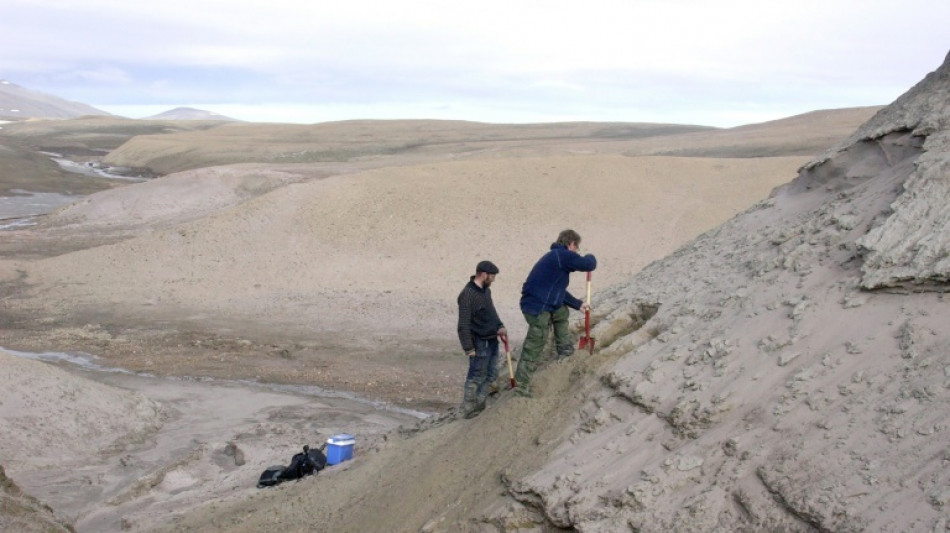
-
 Ukraine Paralympics team to boycott opening ceremony over Russian flag decision
Ukraine Paralympics team to boycott opening ceremony over Russian flag decision
-
Wales captain Lake wants fans to bring 'noise' against Scotland

-
 Skier Vonn's Italian hospital a hotbed of men, sister says
Skier Vonn's Italian hospital a hotbed of men, sister says
-
India target S.Africa top order, Abhishek to come good: bowling coach

-
 Carrick praises Man Utd 'diversity' after Ratcliffe's immigrant rant
Carrick praises Man Utd 'diversity' after Ratcliffe's immigrant rant
-
I never thought it would be hit, says 'Scream' creator 30 years later

-
 AI summit statement delayed to 'maximise' signatories: India
AI summit statement delayed to 'maximise' signatories: India
-
Barcelona's Sagrada Familia basilica hits peak height

-
 Milan sprints to second straight UAE stage win as Tiberi keeps lead
Milan sprints to second straight UAE stage win as Tiberi keeps lead
-
US GDP growth misses expectations as Trump blames shutdown

-
 Benfica investigate video of fans' monkey gestures
Benfica investigate video of fans' monkey gestures
-
French minister pledges tight security at rally for killed activist

-
 Guardiola 'couldn't care less' about Arsenal stumble in title race
Guardiola 'couldn't care less' about Arsenal stumble in title race
-
UK police search property as royals reel from Andrew's arrest

-
 Germany's Merz to visit China next week
Germany's Merz to visit China next week
-
Kompany says Mourinho made 'huge mistake' in Vinicius racism row

-
 X appeals EU's 120-mn-euro fine over digital content violations
X appeals EU's 120-mn-euro fine over digital content violations
-
Galthie recalls hulking locks Flament, Meafou for Italy

-
 Turkey, Saudi sign major solar power deal
Turkey, Saudi sign major solar power deal
-
US Olympic freeskier Hess embraces 'loser' tag after Trump blast

-
 European stocks rebound, oil prices ease after US-Iran volatility
European stocks rebound, oil prices ease after US-Iran volatility
-
'Alpha male' AI world shuts out women: computing prof Hall

-
 New Zealand freestyle skier Ives in hard Olympic crash
New Zealand freestyle skier Ives in hard Olympic crash
-
New Zealand must adapt quickly to Sri Lanka wickets: Chapman

-
 Thai activist's jail term for royal insult extended to 30 years
Thai activist's jail term for royal insult extended to 30 years
-
Families of Duterte's drug war victims eye Hague hearing with hope

-
 India chases 'DeepSeek moment' with homegrown AI
India chases 'DeepSeek moment' with homegrown AI
-
UN touts panel for 'human control' of AI at global summit

-
 Ukraine Paralympics team to boycott Opening Ceremony over Russian flag decision: statement
Ukraine Paralympics team to boycott Opening Ceremony over Russian flag decision: statement
-
UK monarchy reels from Andrew's stunning arrest

-
 Somaliland, where Muslims love Israel
Somaliland, where Muslims love Israel
-
Florida airport to be renamed after US President Donald Trump

-
 Fans flock to Japan zoo to see viral baby monkey Punch
Fans flock to Japan zoo to see viral baby monkey Punch
-
Stocks mixed, oil rises after Trump Iran threat

-
 Outspoken Laos lawmaker's election exit sparks rare dissent
Outspoken Laos lawmaker's election exit sparks rare dissent
-
Kim Jong Un vows to boost living standards as he opens rare congress

-
 Shepherd hat-trick to Samra ton: Five top T20 World Cup performances so far
Shepherd hat-trick to Samra ton: Five top T20 World Cup performances so far
-
Zimbabwe surprise as T20 World Cup Super Eights begin without Australia

-
 Victorious Takaichi promises 'strong and prosperous' Japan
Victorious Takaichi promises 'strong and prosperous' Japan
-
Ex-South Korea leader apologises for martial law crisis

-
 Ex-S. Korea leader apologises for martial law crisis
Ex-S. Korea leader apologises for martial law crisis
-
Messi kicks off MLS season in key World Cup year

-
 Teen burnout to Olympic gold: Alysa Liu 'looking to inspire others'
Teen burnout to Olympic gold: Alysa Liu 'looking to inspire others'
-
Cunningham stars as NBA-leading Pistons ease past Knicks

-
 Andre Gomes joins MLS side Columbus Crew
Andre Gomes joins MLS side Columbus Crew
-
Scottish inconsistency 'bugs everyone' says former international Beattie

-
 England turn to Pollock for Six Nations boost against Ireland
England turn to Pollock for Six Nations boost against Ireland
-
Arsenal aim to banish title jitters in Spurs showdown

-
 Scrutiny on Flick rises as Barca seek recovery
Scrutiny on Flick rises as Barca seek recovery
-
Leipzig host red-hot Dortmund with Champions League hopes slipping away


Scientists find 2-million year-old DNA in Greenland
Scientists in Greenland announced Wednesday they had found DNA dating back two million years -- the oldest ever extracted -- in sediment from the Ice Age, opening a new chapter in paleogenetics.
"We are breaking the barrier of what we thought we could reach in terms of genetic studies," said Mikkel Winther Pedersen, co-author of a new study published in science journal Nature.
"It was long thought that one million years was the boundary of DNA survival, but now we are twice as old" as that, told AFP.
They found the DNA fragments in sediment from the northernmost part of Greenland known as Kap Copenhagen, said the University of Copenhagen lecturer.
The fragments "come from an environment that we do not see anywhere on Earth today," he added. Frozen in a remote unpopulated area, the DNA had been very well preserved.
New technology enabled the scientists to determine that the 41 fragments were more than a million years older than the oldest known DNA, from a Siberian mammoth.
They had to first determine whether there was DNA hidden in the clay and quartz, then see whether it could be removed from the sediment to examine it.
The method used "provides a fundamental understanding of why minerals, or sediments, can preserve DNA", said Karina Sand, who heads the geobiology team at the University of Copenhagen and who took part in the study.
"It's a Pandora's box we're just about to open up", she added.
- Species adaptability -
The "rivers running through the environment transported minerals and organic material into the marine environment and this was where these terrestrial sediments were deposited", said Winther Pedersen.
Then, at some point around two million years ago, "this land mass beneath the water was raised up and became a part of North Greenland", he explained.
Today, Kap Copenhagen is an Arctic desert, where different types of deposits, including plant and insect fossils preserved in excellent condition, have already been discovered.
But scientists hadn't tried to establish the fossils' DNA, and very little was known about the presence of animals at the time.
The research team, which began its work in 2006, has now made it possible to paint a picture of what the region looked like two million years ago.
"We had this forested environment with mastodons and reindeer and hares running around in the landscape together with a lot of different plant species", he said, they had found 102 different kinds of plant.
The presence of mastodons was particularly noteworthy, he added, never having been found so far north before. The discovery has also given researchers more information about the adaptability of species.
Two million years ago, Greenland had temperatures 11 to 17 degrees warmer than today, but at its latitude, the sun doesn't set in summer nor rise in winter.
"We don't see this environment anywhere, this mix of species anywhere on Earth today", said Winther Pedersen.
"The plasticity in species, how species are actually able to adapt to different types of climate, might be different than what we previously thought.
"And obviously, it makes us look for newer and older sites.
"There are several different sites across the world that actually have geological deposits that go this far back. And even further back," ha added.
P.Mathewson--AMWN

